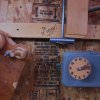Odie
Panning for Montana gold, with Betsy, the mule!
Advice for newbies, and maybe a few others!
I can remember having a lot of ideas for shop jigs and improvements way back when......and was afraid I'd ruin things, lose money, be disappointed.....
Reality check #1.....Not all ideas will, or can be what you envision them to be.....but a few of them that didn't, could have!
Reality check #2.....If you don't transport those ideas into the physical world, they will never be a success.
Reality check #3.....If you try, fail, and give up, a failure will ALWAYS be a failure.
If you want your shop and tools to do for you what you envision them to do.....you MUST take a gamble here and there. I still ruin things, lose R&D money, and am disappointed with my results.....but I no longer fear failures! I accept that they will happen! Like the song: "What doesn't kill you, makes you stronger", is so true! Another thing that is so true is the old saying: "If at first you don't succeed, try try again". There have been many things I've made an attempt to do, and failed......and the good news is I did succeed on the 2nd, or 3rd, or 12th attempt.....on a few of them. Almost nothing works as well as the "vision", but sometimes did after keeping a positive attitude and not giving up. Certainly, there is a time to give it a break, and look at the project again later. There is also a time to accept the inevitable, but to cross the idea of of making a certain improvement off the list entirely, will carve a failure in stone......
One of my biggest reasons for failure, is never having tried......and, one of the biggest reasons for not trying, is to tell myself I'll get around to it later. Once in a blue moon, I would get a "round tuit", but there was a point where I could identify that the source of not getting things done, is not that I didn't have good intentions, but the memory of that idea, and the enthusiasm..... diminishes with time.
Who knows........maybe I'm just an old geezer who isn't relevant in today's world of instant gratification......but, I am relevant in MY world!
ko
I can remember having a lot of ideas for shop jigs and improvements way back when......and was afraid I'd ruin things, lose money, be disappointed.....
Reality check #1.....Not all ideas will, or can be what you envision them to be.....but a few of them that didn't, could have!
Reality check #2.....If you don't transport those ideas into the physical world, they will never be a success.
Reality check #3.....If you try, fail, and give up, a failure will ALWAYS be a failure.
If you want your shop and tools to do for you what you envision them to do.....you MUST take a gamble here and there. I still ruin things, lose R&D money, and am disappointed with my results.....but I no longer fear failures! I accept that they will happen! Like the song: "What doesn't kill you, makes you stronger", is so true! Another thing that is so true is the old saying: "If at first you don't succeed, try try again". There have been many things I've made an attempt to do, and failed......and the good news is I did succeed on the 2nd, or 3rd, or 12th attempt.....on a few of them. Almost nothing works as well as the "vision", but sometimes did after keeping a positive attitude and not giving up. Certainly, there is a time to give it a break, and look at the project again later. There is also a time to accept the inevitable, but to cross the idea of of making a certain improvement off the list entirely, will carve a failure in stone......
One of my biggest reasons for failure, is never having tried......and, one of the biggest reasons for not trying, is to tell myself I'll get around to it later. Once in a blue moon, I would get a "round tuit", but there was a point where I could identify that the source of not getting things done, is not that I didn't have good intentions, but the memory of that idea, and the enthusiasm..... diminishes with time.
Who knows........maybe I'm just an old geezer who isn't relevant in today's world of instant gratification......but, I am relevant in MY world!
ko
Attachments
Last edited:

